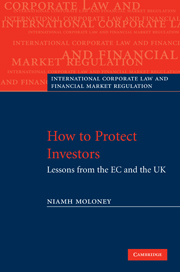Book contents
- Frontmatter
- Contents
- Preface and acknowledgments
- Table of cases
- Table of treaties and legislation
- List of abbreviations
- 1 The retail investor and the EC
- 2 Designing a retail investor protection regime
- 3 Product regulation
- 4 Investment advice and product distribution
- 5 Disclosure
- 6 The trading process
- 7 Education and governance
- 8 Supervision, enforcement and redress
- Index
- References
4 - Investment advice and product distribution
Published online by Cambridge University Press: 26 February 2010
- Frontmatter
- Contents
- Preface and acknowledgments
- Table of cases
- Table of treaties and legislation
- List of abbreviations
- 1 The retail investor and the EC
- 2 Designing a retail investor protection regime
- 3 Product regulation
- 4 Investment advice and product distribution
- 5 Disclosure
- 6 The trading process
- 7 Education and governance
- 8 Supervision, enforcement and redress
- Index
- References
Summary
Intermediation, its risks and regulation
The benefits of advice
The EC retail market is strongly characterized by intermediation in the form of investment advice and related investment product distribution services. Reliance on advisers, whether in the form of independent advisers or, more commonly, bank-based financial supermarkets, is significant. This reliance is in many respects inevitable and rational, and it can lead to stronger market engagement. Investment advice has an educational dimension. The adviser can counter decision-making defects and dilute deeply rooted biases, including framing effects, the status quo effect, the tendency to sell winners more quickly than losers and the home bias, which can drive poor diversification. Given that information-gathering represents a significant barrier to retail market entry, advice may improve market engagement in that information-gathering is outsourced to the adviser. Market risks may be contained where advice is sought and higher returns may follow; evidence from Germany and the UK suggests positive outcomes from advice.
The risks
But investors face a series of risks from advice services. The relationship between the service provider and the investor is characterized by often severe informational asymmetries and by limited investor competence. Retail investors are rarely in a position to monitor advisers effectively and have difficulties in assessing the quality of advice. Decision-making difficulties are exacerbated as adviser failures may not become apparent for some time and as retail investors are unlikely to gain experience as investment decisions tend to be irregular.
- Type
- Chapter
- Information
- How to Protect InvestorsLessons from the EC and the UK, pp. 192 - 287Publisher: Cambridge University PressPrint publication year: 2010



